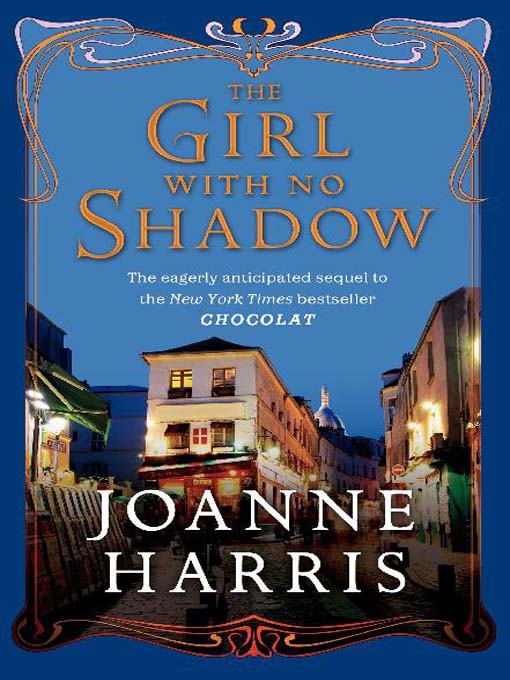
(and it's on sale right now at amazon, t00! $8.23 for the hardcover!)
If you haven't read Chocolat or at the very least, seen the movie, stop reading this and take care of that business first. If you have, then sit back and read on...
I remember how I felt after reading Chocolat the first time: deliciously sated, bemused, lost in Joanne Harris's dreamlike France, with a ghostly trace of chocolate on my fingertips. But also, a little bereft. I didn't wholly like the way the novel ended, with Vianne following the wind and leaving her heart in Lansquenet with Roux. So when I heard that there was a sequel novel, I was very interested. Very curious to see whether Vianne and her heart would be reunited.
The Girl with No Shadow begins with a new character who gathers identities like other Parisians gather items at the market: almost daily and with great discrimination. It's frightening how easily this girl can sift through a few pieces of mail to find enough details to access bank accounts, apply for a passport, rent an apartment. And Francoise Lavery becomes Zozie, who bumps into a 4-years-older Anouk standing outside a black-swathed chocolaterie in Paris. Anouk says she is on her way to a funeral, and when Zozie asks her whose it is, Anouk replies "My mother's. Vianne Rocher."
I almost swallowed my chocolate at that! How would a dead woman ever find her heart again? But Anouk was lying. She's eleven now, and she struggles with her differentness as she tries to find a place in the world. Soon Vianne appears, dressed for the funeral, with a nearly four-year-old redhead in tow. And as Zozie watches Anouk skip off down the street, the colors of her power trailing her like kite strings, with Pantoufle in her wake, she realizes that this girl is too luscious to pass up.
So the story unfolds, told alternately by Vianne, Zozie, and Anouk. As Anouk (now called Annie) struggles to fit in at a school where designer clothes and hairstyles defines popularity. As Zozie sweetly infiltrates Vianne's chocolaterie and Anouk's confidence. As Vianne struggles to accept the dependability a man of wealth and power can provide for her and her daughters. And as Roux returns, diffident and passionate, perhaps to disrupt everything.
It is a novel of love, of chocolate, of choices. Because of it, I bought a new pair of red shoes and ate too much chocolate and may just have booked a flight for Paris. Highly recommended.
If you haven't read Chocolat or at the very least, seen the movie, stop reading this and take care of that business first. If you have, then sit back and read on...
I remember how I felt after reading Chocolat the first time: deliciously sated, bemused, lost in Joanne Harris's dreamlike France, with a ghostly trace of chocolate on my fingertips. But also, a little bereft. I didn't wholly like the way the novel ended, with Vianne following the wind and leaving her heart in Lansquenet with Roux. So when I heard that there was a sequel novel, I was very interested. Very curious to see whether Vianne and her heart would be reunited.
The Girl with No Shadow begins with a new character who gathers identities like other Parisians gather items at the market: almost daily and with great discrimination. It's frightening how easily this girl can sift through a few pieces of mail to find enough details to access bank accounts, apply for a passport, rent an apartment. And Francoise Lavery becomes Zozie, who bumps into a 4-years-older Anouk standing outside a black-swathed chocolaterie in Paris. Anouk says she is on her way to a funeral, and when Zozie asks her whose it is, Anouk replies "My mother's. Vianne Rocher."
I almost swallowed my chocolate at that! How would a dead woman ever find her heart again? But Anouk was lying. She's eleven now, and she struggles with her differentness as she tries to find a place in the world. Soon Vianne appears, dressed for the funeral, with a nearly four-year-old redhead in tow. And as Zozie watches Anouk skip off down the street, the colors of her power trailing her like kite strings, with Pantoufle in her wake, she realizes that this girl is too luscious to pass up.
So the story unfolds, told alternately by Vianne, Zozie, and Anouk. As Anouk (now called Annie) struggles to fit in at a school where designer clothes and hairstyles defines popularity. As Zozie sweetly infiltrates Vianne's chocolaterie and Anouk's confidence. As Vianne struggles to accept the dependability a man of wealth and power can provide for her and her daughters. And as Roux returns, diffident and passionate, perhaps to disrupt everything.
It is a novel of love, of chocolate, of choices. Because of it, I bought a new pair of red shoes and ate too much chocolate and may just have booked a flight for Paris. Highly recommended.




